Were you injured at a store or in a parking lot? You may have to take legal action to secure the compensation you deserve for your injuries.
The personal injury lawyers at Poynter & Bucheri Accident Recovery have secured millions in compensation for injured people in retail negligence cases. We get results because we have the experience and strategic thinking it takes to handle these complex cases.
Why Choose Poynter & Bucheri Accident Recovery for Your Retail Store Negligence Claim?
Retail negligence can be challenging to prove, but our attorneys succeed in these cases through diligence and legal expertise. Our results include high-value awards that allow our clients to focus on recovery and stop worrying about expensive medical bills and losses.
When you meet with your lawyer from Poynter & Bucheri Accident Recovery, you can trust them to provide an honest assessment of your case including your legal options and potential avenues to compensation. They will remain by your side, helping you navigate the legal processes and seeking ways to maximize your injury compensation.
After your injury in a grocery store, department store, or retail store, call 1-800-265-9881 to speak with a Poynter & Bucheri Accident Recovery representative. We’ll help you file a premises liability case to get the compensation you deserve. We represent clients in Indianapolis and throughout the surrounding areas.
Our Indianapolis personal injury lawyers offer free consultations for accident victims. The lawyers of Poynter & Bucheri, LLC want to help you fight for your right to be compensated when a negligent party causes you an injury.
What Is Retail Store Negligence?
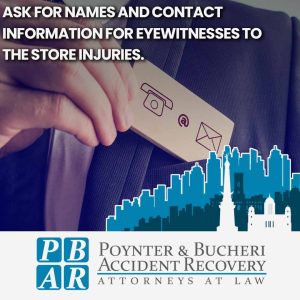
According to the Bureau of Labor Statistics, there are more than 1 million retail outlets in the United States. These stores employ over 15 million people. That’s a huge number of store employees capable of making potentially dangerous mistakes.
A retail store manager or owner is responsible for keeping customers safe and promptly addressing any hazards. After an accident, you can hold the store liable for your slip-and-fall injuries.
In Indiana, the premises liability law means that property owners are responsible for injuries, damages, or deaths when the incident occurs because of unsafe property conditions. To prove the store’s liability, you must show that the property owner knew about the risk or danger and did not take steps to fix it. When a store fails to address dangers, the owner can be held liable.
As you shop at a grocery store, department store, or another type of retail store, you are legally an invitee, which is someone who has been invited or permitted onto the property for the benefit of the owner. If an accident occurs, the store owner would be considered negligent under premises liability law only under certain conditions.
Conditions for Retail Negligence in Indiana
To show the store’s negligence, you’ll need to demonstrate five main points:
- The store owner owes a duty to you, the injured person, to maintain a reasonably safe environment.
- They breached this duty when they did not maintain a reasonably safe environment.
- But for their action or failure to act, you wouldn’t have suffered the injury.
- Their behavior was the proximate cause of the injury and they could have foreseen it. Proximate cause means “legal cause,” or one that the law recognizes as the primary cause of the injury.
- You suffered damages, like healthcare bills from receiving medical attention.
What Is a Slip-and-Fall Injury?
Slip-and-fall injuries may sound like minor injuries, but there are many variations of these accidents from minor to severe. Each can become a personal injury case where an accident occurred and a retail owner is held liable for a customer injury.
Possible Slip-and-Fall Hazards in a Retail Accident Case
- Spilled liquids or materials
- Leaking water from a freezer or display case in grocery store
- Icy pathways or entryways
- Poor lighting on the store premises
- A lack of security measures in parking lots and stores
- Broken or wobbly handrails on staircases or rotting steps
- Malfunctioning shopping carts
- Signs in checkout lanes that protrude into the aisles
- Uneven or cracked flooring
- Extension cords or wires that cause tripping hazards
- Sharp display hooks that cause cuts and other injuries
- Displays that have been overloaded and lack structural integrity
- Uneven displays by store management that easily collapse
- Delivery drivers stacked items too high, causing them to fall or become dangerous
- Pallets were placed improperly in the store aisles
- Cluttered aisles created unnecessary tripping hazards and severe injuries
- Overcrowding occurred without appropriate crowd control and security measures
- The store had defective or improperly mounted store fixtures, cabinets, or shelving displays
- There were poorly maintained escalators, elevators, or automatic doors
- Store owners ignored assaults or muggings in parking lots
There are many other potential risks depending on which store you visit, how vigilant and aware they are of hazards on the premises, how exhausted or understaffed their employees are, and what kind of safety plans store management has in place.
Common Retail and Department Store Negligence Injuries
As a result of an accident in a retail store, you may suffer from a wide variety of personal injuries. Here are some of the most common injuries causing extensive medical expenses.
Concussions and/or Traumatic Brain Injury (TBI)
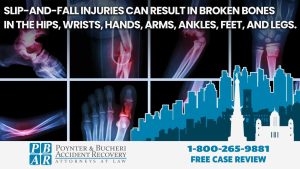
The effects of a head injury may include a concussion or a more serious injury like a TBI. Both concussions and TBIs result in changes in brain function.
Symptoms can include nausea, dizziness, drowsiness, headaches, memory loss, and more. Concussions and brain injuries can happen when people fall, but also when heavy items fall on them.
Lacerations
Lacerations account for any tearing or breaking of the flesh and can be the result of a slip-and-fall accident that occurs in a hazardous, unkept, or hard-surface area, or one that occurs where other objects are disrupted.
Contusions
Contusions, also known as bruises, are the result of blood collecting outside of a blood vessel.
Spinal Cord Injuries
Injuries to the spinal cord are some of the most serious injuries and can result in loss of motor function and other nervous system issues.
Fractures
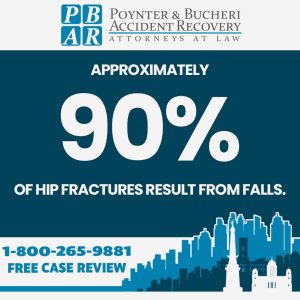
Slip-and-fall injuries commonly result in broken bones in the hips, wrists, hands, arms, ankles, feet, and legs. Hip fractures are particularly common in older adults, whose bones may be frail. Approximately 90% of hip fractures result from falls.
Sprains, Strains, and Tears
Sprains are the stretching or tearing of the ligament, whereas strains affect the muscle or tendon. Both can be quite painful and can result in rest, compression, pain medication, or even the use of crutches or a cane.
Paralysis
In the most severe cases, the victim can suffer paralysis, incapacitation, or death.
Steps to Take After Your Retail Accident Injury
Injured in a store? Act quickly to preserve your rights and gather evidence of the store’s negligence that could be lost forever.
Here are the best steps to take:
Report the Fall Immediately
After being injured in a store, ask the owner or manager to document the store injuries in an incident report. Do not sign any waivers absolving the theme of guilt and do not provide recorded statements.
The store manager should make an incident report and ask you to sign it. Read it carefully to make sure it is accurate before you sign. Get a copy of this incident report before you leave. Notify the police and request copies of police reports.
Take Photographs and Videos
You need photographic or video evidence right away. The accident scene is likely to change after you’re injured in a store because most retail stores will correct the hazardous condition that caused it.
If you cannot take pictures due to your store injury, ask someone to take them with your cell phone. Be sure to get both wide shots and close shots of the scene from as many angles as possible. Photograph any and all injuries you sustain.
Gather Contact Information
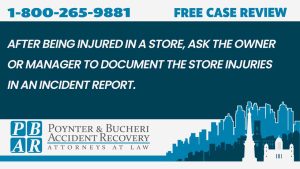
Ask for names and contact information for eyewitnesses to the store injuries. Eyewitnesses provide excellent information about the condition of the property and how the fall occurred. However, in a busy department store, some witnesses may wander away, so try to get witness information quickly.
Request the store’s insurance information and key contact information for the store owner and manager. You don’t have to tell them you’re starting a store injury case, but you can provide this information to your lawyer as they gather evidence for claiming financial compensation.
Seek Medical Attention
If you do not go to the emergency room to seek medical treatment, you should see your doctor as soon as possible for medical help. You could be suffering from a brain injury or other injury that you are not aware of until after a complete examination and medical treatment from a healthcare professional. Save your medical report and all medical records showing medical costs related to your injuries treated at a healthcare practice or in your home.
Preserve Clothing and Shoes
Place everything you were wearing into a bag as evidence. The store’s owner may claim that what you were wearing contributed to the cause of your slip-and-fall. Your personal injury attorney will need your clothes and shoes to challenge that defense.
Do Not Discuss Your Fall or Sign Anything
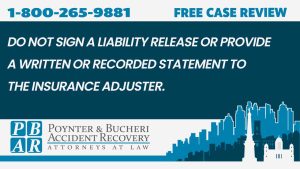
Discuss your injury only with your medical providers and your Indianapolis slip-and-fall attorney. Avoid posting on social media or discussing the situation with family and friends.
Do not sign a liability release or provide a written or recorded statement to the insurance adjuster. Talk to a personal injury attorney before starting an insurance claim, providing any statements, or signing any medical releases related to the accident or your injuries.
The insurance adjuster may pressure you to provide a statement for your insurance claim. Don’t allow them to confuse or pressure you about your store negligence claim. Speak with a store injury lawyer who is qualified to advise you.
Follow Medical Advice and Treatments
Be sure to follow through with your doctor’s prescribed treatment and get the appropriate medical help for any and all injuries sustained. Failing to do so may harm your personal injury claim, which can cover most injury-related expenses eligible for compensation.
Consult an Indianapolis Retail Store Negligence Lawyer
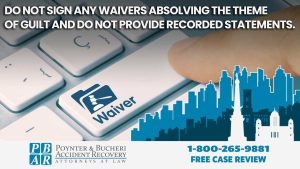
A department store owner or manager may tell you they will handle your expenses related to your retail store negligence injuries, and they may be telling the truth. However, you need to consult with an experienced personal injury attorney to ensure you can pursue the full and fair compensation you deserve, especially if you have serious injuries ultimately eligible for high-value compensation.
How to Assess the Value of Your Damages in Retail Accidents
If you are unable to reach a fair settlement with the store’s insurance company, you and your personal injury lawyer may start a lawsuit over your store injury. Under Indiana’s premises liability laws, victims may claim financial damages and non-economic damages in personal injury cases.
Financial Damages
- Medical expenses related to your medical report, including emergency services, hospital stays, physicians, surgeries, medical equipment, physical therapy, counseling, and more.
- Loss of income due to your store injury, including lost wages, loss of future income, and decreased earning potential.
- Ongoing medical and personal care for permanent impairment or disability.
- Other out-of-pocket expenses such as travel costs, over-the-counter medications, help with household chores, and home modifications to accommodate an impairment.
Non-economic Damages
- Physical pain and discomfort
- Scarring and disfigurement
- Permanent impairments
- Emotional distress and mental anguish
- Development of phobias, such as of heights or of falling
- Loss of enjoyment of life and loss of consortium
Understanding Indiana’s Modified Comparative Negligence

Insurance companies are required to pay for legitimate store injury claims, but they also try to minimize payouts. They may claim you contributed to your injuries on the store’s premises. It’s important to be aware of Indiana’s modified comparative negligence laws.
The plaintiff must be less than 51% at fault for the incident to succeed with an injury claim. Courts reduce recovery in proportion to each party’s contribution to negligence. Under modified comparative negligence, both you and the store can be found liable. As long as you are less than or equal to 50% responsible, you may still recover damages.
Damages are modified to reflect the percentage of liability. Imagine you are seeking damages of $100,000 to cover your medical bills, lost wages, and pain and suffering after tripping over a pallet and suffering a head injury in a big box store.
The judge or jury will determine whether the store was negligent in leaving the pallet in a walkway. After negligence is established, they will determine whether you share in any of the blame for the accident. Perhaps you were on your phone or you ignored a sign warning you about the pallet.
Imagine that you were found to be 25% liable. Because both parties were determined to be negligent, and you as the injured party were found to be 50% or less responsible, you are entitled to damages. You would recover 75% of the $100,000, or $75,000.
Outside the courtroom, settlements involving retail stores also reflect the notions of comparative negligence. The insurance company will want to pay as little as possible, so they will make the argument that you are responsible for all or part of the accident.
Work with a qualified retail store negligence lawyer to make the strongest, most effective case possible against the property owner.
What Is the Indiana Statute of Limitations in Retail Accident Cases?
The deadline for starting Indiana lawsuits in retail injury cases is two years. If you do not file your lawsuit within that time, you will lose your chance to take legal action.
How to Stay Safe in Retail Stores
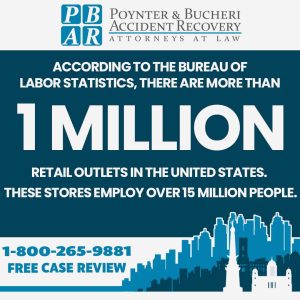
1. Pay attention to your surroundings. Watch out for things jutting into the aisles and stay off your phone while you are walking. Check your shoelaces or scarf before stepping onto an escalator.
2. In a mall or shopping center, avoid isolated areas with poor lighting. Read any caution signs and heed their warnings. If you notice a spill or leak, notify a store employee.
3. Don’t climb up to a high shelf to retrieve an item. Always ask a store associate for help.
4. Keep your children nearby. Don’t allow them to crawl under clothing racks or play with stacked display items that could topple on them.
5. After an injury in a retail store, don’t try to deal with their insurance company by yourself. Consult an experienced retail store negligence attorney to hold the store liable.
Poynter & Bucheri Accident Recovery — Indianapolis Personal Injury Attorneys
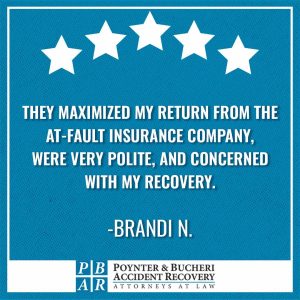
If you were injured in a store, we can help you evaluate your legal options and take action. Our goal is to allow you the time and energy you need to recover from your injuries while we focus on your retail accident case.
There is no obligation to use our services. Your initial case review is free and will help you understand your options for accident compensation.
Request a free case review with an experienced attorney by calling Poynter & Bucheri Accident Recovery at 1-800-265-9881.
